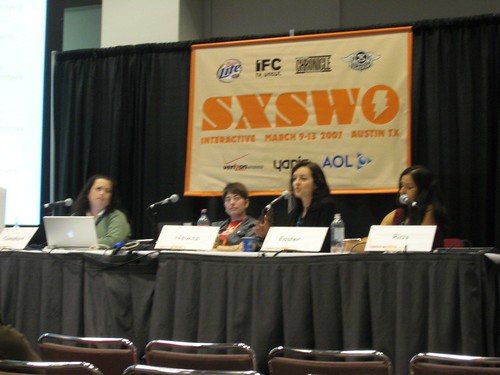The buzz around the Web 2.0 Summit this week got me thinking about why we attend conferences in today’s world of near constant connectivity and information overload. I remember listening to TWIT sometime around CES when Dvorak talked about how he was “virtually”attending CES. He had decided to skip the travel and follow the news coverage virtually rather than physically attending the event. With thousands of other journalists in attendance, Dvorak decided that having one more technology reporter on the show floor was not a good use of his time.
Before every company had a website, before bloggers, and before RSS readers, we attended conferences because conferences were the primary mechanism for learning about new technologies. Now, we can read our favorite blogs, newspapers, and trade magazines from the comfort of our couches in our pajamas with wireless laptops. With so many great summaries of every conference appearing online and bloggers posting live updates whenever someone important sneezes, the need to attend conferences to gather information is greatly diminished.
Historically, we also attended conferences to hear the experts speak on relevant topics; however, podcasts are making conference keynotes, sessions, and even panels less relevant. I admit to being a podcast addict. I typically subscribe to more podcasts than any one human being could possibly process, but it does give me the opportunity to pick and choose based on my current interests. I regularly hear interviews with open source experts on FLOSS Weekly and the O’Reilly Foo Casts, web 2.0 experts on TalkCrunch, and a little bit of everything related to the tech industry from TWIT and PodTech. I do not need to attend a big conference to hear the experts and their latest ideas about technology.
Conferences have also become a mechanism for corporate PR and product launches designed to capitalize on the topical buzz around the time of a big conference, but in reality, the press releases and launches tend to get lost in the noise with dozens and even hundreds of press releases crammed into just a few short days. This is also a holdover from the days when people attended conferences to learn about the next new thing, and corporate types have the conference press release machine in motion.
I am not saying that we should stop attending conferences; however, our reasons for attending have changed over time. I currently attend conferences mainly to hold meetings with customers / partners and network with other smart people to generate new ideas and new ways of thinking about the tech world. The customer meetings and networking usually happen outside of the traditional conference format as lunches, dinners, and informal hallway conversations. Typically, I can learn more by spending 10 minutes in a hallway chat with someone than I can learn in an hour long conference session. Conferences are a great way to gather a whole bunch of experts and those wanting to learn more about a topic together in one place to facilitate learning and the sharing of new ideas and thoughts.
I am starting to wonder if technology conferences are due for a change. Maybe fewer talking heads and fewer keynote sessions with a larger number of small discussion groups giving people an opportunity to share ideas. I am also becoming a fan of the “un-conference” format popularized by FooCamp and BarCamp, which provide a framework for a conference where intimate discussions can be more easily organized; however, I do not know how well the un-conference format would scale when you get larger numbers of attendees. I recently had a discussion at a party with Identity Woman aka Kaliya who is an advocate for a hybrid approach like the un-conferences, but with a little more structure to keep people on track.
I am not quite sure if there is an “answer” to the conference dilemma, but I suspect that the time is right for a broader change in how we organize and attend technology conferences.
